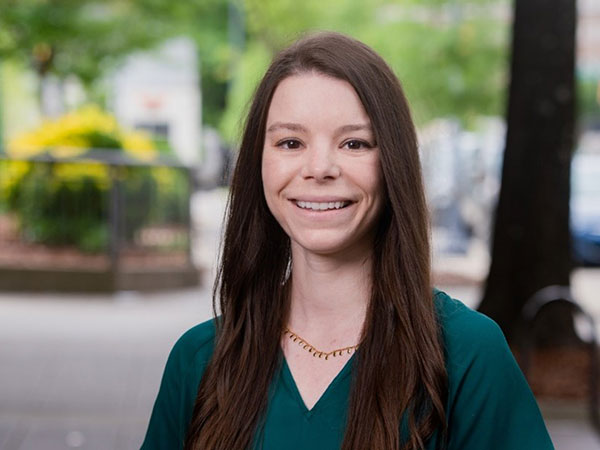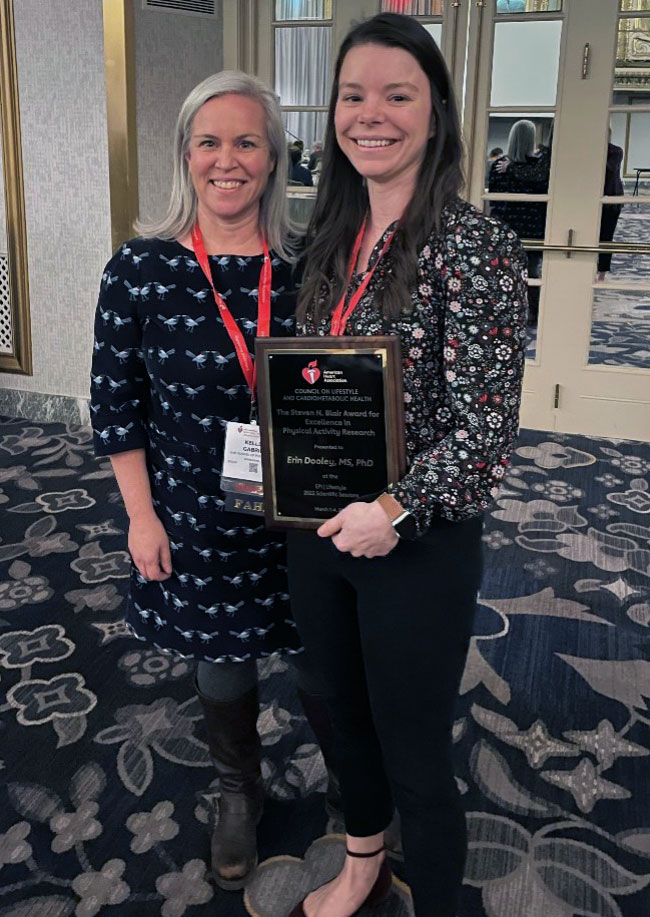 This award is given to the abstract with the highest score based on the scientific merit, quality, and originality of all abstracts submitted to the category of physical activity, named in honor of Dr. Steven N. Blair for his career as a clinical researcher in the areas of exercise, physical activity, and cardiovascular health. Last year, Dr. Kelley Gabriel presented preliminary findings on the consequences of sedentary lifestyles at this same conference.
This award is given to the abstract with the highest score based on the scientific merit, quality, and originality of all abstracts submitted to the category of physical activity, named in honor of Dr. Steven N. Blair for his career as a clinical researcher in the areas of exercise, physical activity, and cardiovascular health. Last year, Dr. Kelley Gabriel presented preliminary findings on the consequences of sedentary lifestyles at this same conference.
This abstract, entitled, “Multimorbidity is Associated with Lower 24-Hour Movement Activity among U.S. Adults” examined how living with multimorbidity, or having two or more chronic conditions, is associated with total daily activity. Multimorbidity has been found to be associated with worse quality of life, more stress, lower ability to do daily tasks, and more healthcare utilization, longer hospital stays, more postoperative complications, which is especially important given that the U.S. population is rapidly aging and life expectancy is increasing, meaning more adults are living into old age with chronic conditions. While multimorbidity is associated with inadequate higher intensity exercise, less is known about how multimorbidity relates to total movement accumulated throughout the day. Emerging research has shown that “every bit counts,” thus it is important to examine movement and physical activity with a whole-day approach lens.
 Pictured from left to right: Dr. Kelley Gabriel (2021 recipient) and Dr. Erin Dooley (2022 recipient) at the 2022 Epi Lifestyle Scientific Sessions, presented by the American Heart Association.
Pictured from left to right: Dr. Kelley Gabriel (2021 recipient) and Dr. Erin Dooley (2022 recipient) at the 2022 Epi Lifestyle Scientific Sessions, presented by the American Heart Association.
This study examined data from 7,013 U.S. adults aged 30 years and older who wore a wrist-worn wearable device in the 2011-2014 National Health and Nutrition Examination Survey (NHANES). This study quantified multimorbidity using 13 chronic conditions including hypertension, congestive heart failure, coronary heart disease, hyperlipidemia (high cholesterol), stroke, arthritis, cancer, chronic kidney disease (CKD), chronic obstructive pulmonary disease (COPD)/ asthma, depression, diabetes, obesity, and memory problems, and 62% had multimorbidity.
Results showed a clear dose-response relation with higher number of chronic conditions and less 24-hour movement. Additionally, presence (vs. absence) of these specific conditions: obesity, diabetes, stroke, chronic kidney disease, cancer, depression, and memory problems were each associated with lower 24-hr movement activity. Ultimately, this proves that multimorbidity is highly prevalent in U.S. adults and associated with lower 24-hr movement.
“I feel very honored to receive this award and especially on the heels of my mentor, Dr Gabriel,” said Erin. “I think it demonstrates the UAB School of Public Health as a leader in physical activity research and promoting healthy lifestyles.”
“Dr. Dooley has the uncanny ability to take a study question to the “next level” given her expertise in physical activity and proficiency in epidemiologic methods and statistical analysis,” said Kelley Pettee Gabriel, Ph.D. “She is an emerging leader within the physical activity research community, and I could not be more proud!”
Dr. Dooley led this study as first author, and led a team from the Department of Epidemiology, including Drs. Ligong Chen, Bjoern Hornikel, Paul Muntner, Beth Lewis, Kelley Pettee Gabriel and Drs. Priya Palta and Pablo Martinez-Amezcua from Columbia University Irving Medical Center. This award was given to Dr. Dooley in Chicago, Illinois at the 2022 Epi Lifestyle Scientific Sessions presented by the American Heart Association.